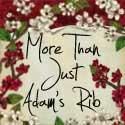 My husband loves to read--and write--about anything political. So, since my week has been jammed with giving a computer training, making a Sweet Sixteen cake for my best friend's daughter, and helping teach five women to crochet, well, I was glad for him to read and review Brown's new book. Without further ado...
My husband loves to read--and write--about anything political. So, since my week has been jammed with giving a computer training, making a Sweet Sixteen cake for my best friend's daughter, and helping teach five women to crochet, well, I was glad for him to read and review Brown's new book. Without further ado...Ronald Reagan’s name had hardly pierced my six-year-old consciousness until the afternoon of March 30, 1981, when John Hinckley, Jr. took aim and fired upon the President and his entourage. In my small parochial schoolhouse the news spread quickly, with teachers running outside to tune their car radios into news stations for information. In that moment, viewing the passion, fervor, and intensity of my teachers, parents, and older students, I began to realize Ronald Reagan was more than a faceless name at the end of my class’s listing of U.S. Presidents.
In the hours and days which followed, my family prayed a multiplicity of prayers for the President’s recovery, and along the way I discovered literally everyone in my small circle of influence believed Ronald Reagan was a leader appointed by a higher power to a higher calling.
According to Mary Beth Brown's new book The Faith of Ronald Raegan, President Reagan felt much the same way: “God, for some reason, had seen fit to give me his blessing and allow me to live a while longer" (p. 15). Later, Ms. Brown confirms President Reagan wrote in his diary: “Whatever happens now, I owe my life to God and will try to serve him in every way I can.” Others have written, “Reagan believed that God had spared his life so that he might go on to fulfill a greater purpose” (Kengor).*
In many ways, Brown’s book about Ronald Reagan’s faith begins from the premise that Ronald Reagan was a man of faith, spirituality, conviction, and principle, and the book then sets about to “prove” this contention through discussing various stages of Reagan’s life and certain members of his family.
The book certainly has a historical component to the extent it recounts events and circumstances of the Reagan presidency. The book also has a spiritual component in which Brown discusses the meaning of angels and various other theological ideas. Unfortunately, I believe the book fails to effectively “connect” Ronald Reagan to the author’s original premise in any meaningful way.
I believe Brown’s tome reads like one of dozens of papers and pieces I have crafted in graduate school, analyzing an author and his/her works as compared to a particular philosopher or school of criticism. In those papers (and in Brown’s book), the main impetus was to retell the life, story, and facts in a way which supported my own hypotheses. The result, both for me and for Brown, is a final document which communicates the original hypothet but fails to impart the whole story, the whole truth.
Brown’s choice selection of Reagan’s quotes from which a faith inference could be made is not placed alongside other quotes from which one could learn of Ronald Regan’s decided humanity. Rather, Brown presents a one-sided rendition of Ronald Reagan’s life and times—a view which is taken through the “lens” of Reagan’s unending devotion to his faith. Noticeably absent is any real-world perspective which would show how Reagan, though obviously a man of great faith, nevertheless had doubts and fears. Amazingly, Nancy Reagan’s own consultation with an astrologer is not a topic of discussion in the book.** This omission, I believe, speaks volumes regarding the manner in which Ms. Brown has penned this small book.
In the end, I would not recommend the book for an accurate and complete rendition of history. Reagan’s own An American Life amply covers that aspect. I would not recommend the book as a bastion of spiritual thought and learning. In the midst of recounting the events surrounding Reagan’s assassination attempt, Brown stops to give a nearly page-long abstract discourse on the importance of angels (p. 9). Although the section is certainly accurate and authoritative (citing the Bible and Billy Graham), it simply seems to be out of place.
Perhaps my displeasure in reading the book is summed up thusly: I brought a fair knowledge of Ronald Reagan’s life and history with me to the book; however, I hoped to learn some salient points or facts which were theretofore not commonly known. Unfortunately, Mary Beth Brown assembles an odd selection of quotes and facts to support her hypothesis, and she aligns these “pieces” of “proof” into a logically inconsistent and relatively useless book.
At the end of the day, I have no doubt Reagan was a man of devout faith, conviction, and values. I also believe an authoritative book will one day address President Reagan’s faith in a manner worthy of true scholarship and learning. Until then, I will place Ms. Mary Beth Brown’s attempt on my shelf and wait.
Disclosure of Material Connection: I received this book free from the publisher through the BookSneeze book review bloggers program. I was not required to write a positive review, nor did I do so. The opinions I have expressed are my own. I am disclosing this information in accordance with the Federal Trade Commission's 16 CFR, Part 255: "Guides Concerning the Use of Endorsements and Testimonials in Advertising."
*Kengor, Paul (2004). "Reagan's Catholic Connections." Catholic Exchange. http://www.catholiceducation.org/articles/catholic_stories/cs0080.html.
**Kurtz, Howard (2007-05-02). "Ronald Reagan, In His Own Words". The Washington Post. http://www.washingtonpost.com/wp-dyn/content/article/2007/05/01/AR2007050102070.html.








No comments:
Post a Comment